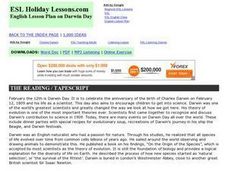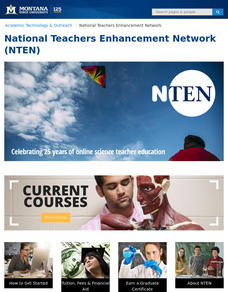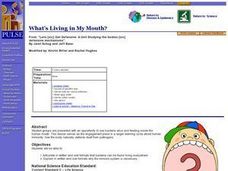Curated OER
What Parts of a Plant Do We Eat?
Did you know that tomtoes and cucumbers are actually fruits? Biology or botany beginners read about the function of flowers and fruit and find that some food items commonly called vegetables are, by definition, also fruits! Give learners...
Curated OER
Invertebrate Phyla
Students explore the invertebrate phyla. They discuss the characteristics of the invertebrate Phyla in the Kingdom Animal. Students classify organisms into Phyla based on their characteristics. They distinguish radial symmetry, bilateral...
Curated OER
Fossils and Dinosaurs
Students explore fossils and dinosaurs. In this science instructional activity, students discuss how fossils are created. Students draw muscles and skin on a stegosaurus.
Curated OER
Mammals: Mammals and Their Ways
Students study the difference between innate and learned behaviors. They observe the adaptations and behaviors of mammals in this series of lessons.
Michigan Sea Grant
Fish Identification
Using a dichotomous key, pupils identify characteristics of fish who live in the Great Lakes and explain how these features help them survive. In small groups, class members discover what features scientists consider important and...
Curated OER
Superbugs: An Evolving Concern
Students investigate the growth of bacteria in the presence of antibiotics. They write a hypothesis, conduct an experiment to test their hypothesis, analyze the results of their bacterial growth experiment, and describe the results on a...
Curated OER
The Meaning of Genetic Variation
Students investigate variation in the beta globin gene by identifying base changes that do and do not alter function, and by using several Internet-based resources to consider the significance in different environments of the base...
Alabama Learning Exchange
Botany Scavenger Hunt Where's the Ginkgo?
Learners use a science journal to log plants that are native to Alabama. In this plant lesson plan, learners identify characteristics, describe environments, and classify the plants that they find.
Curated OER
Case of the Threespine Stickleback
Students examine why some freshwater populations of stickleback fish. In this macroevolution instructional activity students read a study packet then answer questions.
Curated OER
Where Are the Dinosaurs?
Students create a dinosaur egg with balloons and newspaper. In this earth science lesson plan, students explore the extinction of dinosaurs. Students view a web clip and relate it to the extinction of animals they have never seen.
Curated OER
Species Diversity and Phylogeny
Students explore the classification system of organisms: taxonomy. They examine prepared slides of Protozoans and record information on a Taxonomy Recording Sheet. Two additional classifying activities are also included in this lesson.
Curated OER
Big Beans, Little Beans
Middle schoolers measure and note the variation in the lengths of lima beans. They compare the growth rate of different sized beans.
Curated OER
Darwin Day
For this Darwin Day worksheet, students read or listen to a tape passage about Charles Darwin, then match phrases, fill in the blanks, choose words, unscramble words and sentences, put sentences in order, write discussion questions and...
Curated OER
Galapagos Adaptations
Students examine photographs of closely related species found in the Gal??pagos environment, observe differences and similarities between species, and form hypotheses about species differences and the relationship to the environment of...
Curated OER
Where Do I Belong?
Tenth graders study the diversity of life in the world. They classify and sketch organisms into the 6 kingdoms.
Curated OER
Birds Learning Cycle Lesson Plan
Ninth graders explore the various adaptations of birds and compare differences and similarities of different birds.
Curated OER
Stream Quality Assessment
Students investigate many of the factors that affect water quality. They take measurements and water samples at a local stream and evaluate the health of their community's watershed. They write a report detailing their findings.
Curated OER
Biology Chapter 15 Word Search Puzzle
In this biology activity, middle schoolers look for the words that are related to the theme of the activity. They also work on the skills of spelling and word recognition.
Curated OER
What's Living in My Mouth?
Young scholars articulate in written and oral formats that bacteria can be found living everywhere. They explain in written and oral formats why the immune system is necessary. Students are presented with an opportunity to see bacteria...
Curated OER
Variations
Sttudents examine populations of living things and identify variations in physical features.
Curated OER
The Ultimate Predator
Students listen to a lecture by the teacher about the "Ultimate Predator." They design a new "Ultimate Predator." Students present their creations to the class and attempt to convince their classmates that their predator is indeed the...
Curated OER
Hominoid Cranium Comparison
Learners describe, measure and compare cranial casts from contemporary apes (chimpanzees and gorillas, typically), modern humans and fossil "hominids" (erect and bipedal forms evolutionarily separated from apes).
Curated OER
Comparing Microscopic Organisms in Fresh and Polluted Water: An Invitation To Inquiry
Young scholars have the opportunity to develop and formulate ideas and explanations through the scientific standard of inquiry. They identify organisms by using an identification key for specific aquatic geographical area.
Curated OER
Crime Scene: The Case of the Missing Computer Chip
Students, in teams, attempt to solve a simulated crime scene.
























